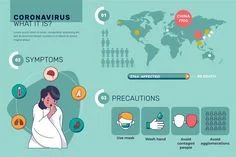What is the action of new Corona Virus on Patients?
Infection with new coronary pneumonia in patients at early stage is mainly similar to cold, so it is easy to be ignored by patients. At the onset of the disease, the patient will have limb weakness, increased body temperature, nasal congestion, dry cough, and runny nose. A few patients will suffer from hypoxia. After taking the antipyretic medication, the patient's temperature will return to normal.
Dyspnea will occur when infected with new coronary pneumonia
One week after the onset of the disease, dyspnea will occur
when infected with new coronary pneumonia.
At this time, the medication can no longer reduce the fever. Patients with severe illness will also have septic shock, respiratory distress and coagulopathy.
Most new coronary pneumonia can recover after treatment, and a few patients are in critical condition and may die.
Incidence of COVID-19 New Coronary Pneumonia very wide
Suffering from new coronary pneumonia is more harmful to the lungs of patients. The pathogenesis of new coronary pneumonia is a gradual aggravating process, generally the most serious in the second week of illness. The incidence of New Coronary Pneumonia is very wide, and anyone can get sick after being infected with the virus.
Now the new coronary pneumonia is in the stage of rapid global development, the disease is caused by infection with viruses. New Coronary Pneumonia is very contagious. The main transmission methods are droplet transmission and direct contact transmission. Items infected by the new coronavirus have the potential to spread the virus. Doctors who treat new coronary pneumonia will choose different treatment options according to different patients.
Coronavirus is very dangerous and highly contagious
Because the symptoms of New Coronary Pneumonia are very
dangerous and highly contagious, the most important thing to actively prevent
the occurrence of this disease is to avoid the patients who are in contact with
New Coronary Pneumonia. Try not to go out at home.
You should take a shower
frequently, and open windows and ventilate regularly in the room. If you have
to go out, you must wear a mask.
The mask should be replaced regularly. You should often wipe alcohol and other items with alcohol. When sneezing, cover your mouth and nose. In terms of diet, light and easily digestible foods should be the main, irritating foods should be eaten less, do not smoke or drink alcohol, and maintain a peaceful attitude, so as to reduce the incidence of disease.
May Refer:
Author's Bio
Name: Gwynneth May
Educational Qualification: MBBS, M.D. (Medicine) Gold Medalist
Profession: Doctor
Experience: 16 Years of Work Experience as a Medical Practitioner


Comments
Post a Comment